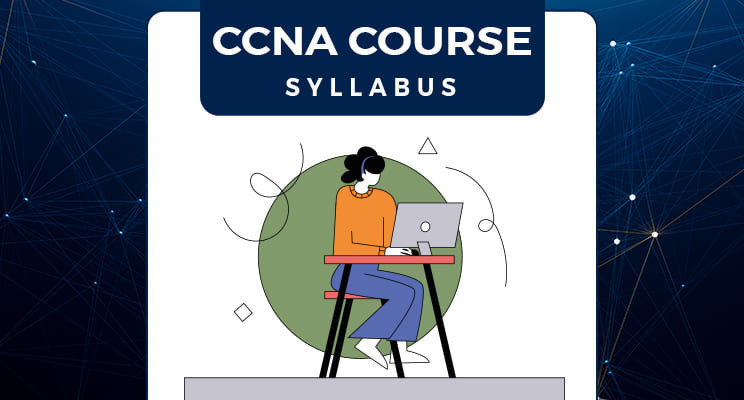views
All You Want to Know about the CCNA Course and Syllabus
In today's digital age, networking is the foundation of every IT infrastructure. Whether you are looking to become a network engineer or heading for a career in cybersecurity, CCNA course (Cisco Certified Network Associate) is a core certification that certifies your networking skills and expertise. At UniNets, our precisely crafted CCNA training equips you with everything needed to ace the exam as well as real-world situations.
If you are genuinely interested in establishing a profitable IT career—whether in system administration, cyber security training, or network security training—knowing the CCNA syllabus and exam format is essential.

What Is the CCNA Course?
CCNA is a world-renowned certification provided by Cisco. It proves your skills in the installation, configuration, operation, and troubleshooting of medium-sized routed and switched networks. Our CCNA training at UniNets integrates theory, lab sessions, and mentorship provided by experts to ensure students understand both basic and high-level networking concepts.
This course is also a great stepping stone prior to delving into advanced areas like information security courses, ethical hacker training course, or certified ethical hacking courses.
Overview of the CCNA Syllabus
The new CCNA syllabus entails a broad scope of networking concepts. At UniNets, we divide the syllabus into manageable modules for ease of learning and an interactive process.
Key CCNA Topics:
Network Fundamentals
Network components (routers, switches, etc.)
IPv4 and IPv6 addressing
Subnetting and cabling types
Network Access
VLANs and trunking
Wireless architecture
Spanning Tree Protocol
IP Connectivity
Static routing and OSPF
Default routes
Troubleshooting IP connectivity
IP Services
DHCP, NAT
NTP, SNMP
DNS concepts
Security Fundamentals
Access control lists (ACLs)
VPN concepts
Firewall basics (excellent prep for network security courses and cyber security courses)
Automation and Programmability
Introduction to controller-based architectures
REST APIs
Configuration management tools such as Puppet and Chef
All of these CCNA topics give a complete understanding of both theoretical and practical things about networking.
CCNA Exam Topics: What to Expect
The CCNA exam objectives are designed carefully to assess your capability to configure, verify, and troubleshoot networks. The exam, which is designated as 200-301, is a 120-minute exam comprised of multiple-choice questions, simulations, and drag-and-drop activities.
At UniNets, our instructors lead the students through:
Practice exams replicating real exam environments
Doubt-clearing sessions every week.
Interactive labs simulating real-world troubleshooting situations
Career Advantages of the CCNA Certification
Obtaining CCNA certification provides multiple career paths in networking and IT. Upon successful completion of the CCNA course, students can apply for positions like network support engineer, system administrator, network administrator, junior network engineer, etc.
It is also a good starting point before moving on to cyber security courses, certified ethical hacking courses, and more advanced tracks such as ethical hacker training course and CEH training online.
How CCNA Complements Cybersecurity Learning
Although CCNA is centered around networking, it heavily overlaps with network security training. Principles such as ACLs, secure device access, VPNs, and firewalls set the stage for more in-depth security material.
It's common for students at UniNets to use their CCNA certification as a stepping stone into information security courses and certified ethical hacking courses to open up more career fields.
For students undertaking ethical hacker training, a good knowledge of routing and switching is important for knowing how systems talk to each other and how attackers could use them against them.
Bonus: Interview Preparation and Linux Knowledge
Knowledge of Linux is valuable for network professionals. As part of learning at UniNets, we also assist students to prepare for technical interviews through:
Linux interview questions to assess system commands, permissions, and file management
In-depth Linux interview questions and answers PDF tutorials
Practice interviews with emphasis on networking and Linux expertise
Linux knowledge not only deepens your server environment expertise but also makes your resume stronger within the field of cybersecurity.
Why Study at UniNets for CCNA?
Here's why UniNets is the go-to destination for your CCNA experience:
Certified Trainers: Get trained by industry experts with certifications
Hands-On Labs: Experience in real-time using Cisco devices
Systematic Learning Path: Pair CCNA with cyber security training, network security training, or CEH online training
Interview Preparation: Free Linux interview questions, CCNA practice tests, and soft skills classes
Placement Support: Resume assistance, job application, and interviews
Whether you are focused on a job in networking, cyber security, or ethical hacking, UniNets makes you industry-ready.
Final Thoughts
The CCNA training is not only a certification—it's the starting point for a lucrative IT career. With a solid grasp of the CCNA syllabus, CCNA exam questions, and fundamental networking, you're ready to tackle jobs and higher-level certifications. Combining it with complementary skills from cyber security training, information security training, or even certified ethical hacking training makes you stand out in today's marketplace.






















Comments
0 comment